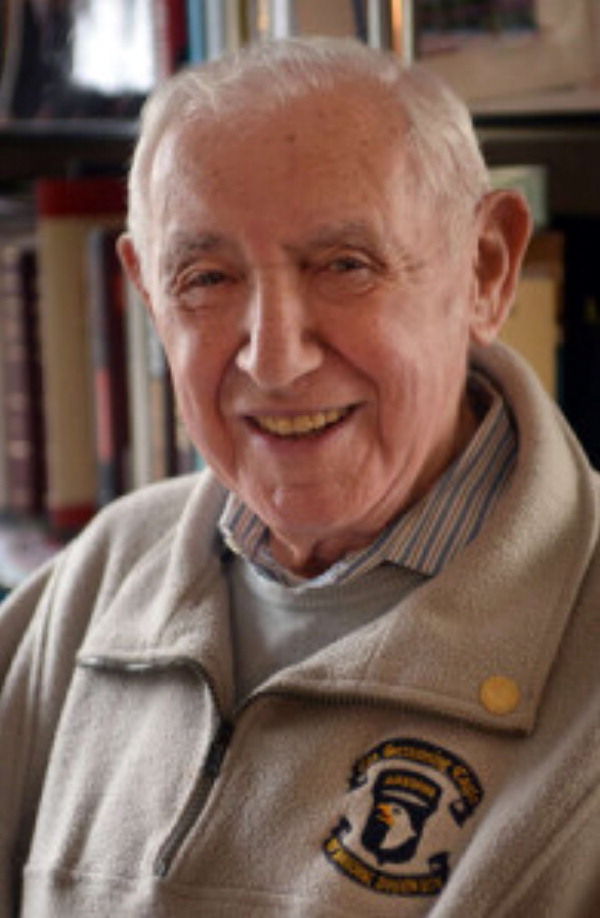By Amy Batista, Special Writer
CRANBURY – A local resident is the co-author of a Holocaust memoir of a man who went from an Auschwitz prisoner to a solider in the 101st Airborne Division.
On Feb. 19, Cranbury resident Robin Black will be speaking about her experience ghostwriting the book she co-authored with David Wisnia titled, “One Voice, Two Lives” at 7 p.m. Friday, Feb. 19, at the Cranbury Library.
“The book is about David’s life from childhood to immediately after the war in 1945,” said Ms. Black in an email on Monday. “It focuses primarily on his over two years in Auschwitz and his rescue by the 101st Airborne Division after he was able to escape from a train taking him from Dachau to a work camp.”
Mr. Wisnia, a child singing star in Poland, was the middle child in a family of five. His father was a prosperous furniture manufacturer; his mother a contented housewife. After the family moved to Warsaw, it was occupied, and tragedy struck his family. David became a fugitive on the run from the Nazis, according to the book website.
Eventually rounded up by the SS, David was deported to the Auschwitz-Birkenau concentration camp. There, because he could sing, he became a “privileged prisoner” and was assigned a more secure job disinfecting clothing in the sauna. Despite this, he lived through three years of fear, knowing each day could be his last.
David survived several horrors in Auschwitz, as well as a final death march with fellow inmates, where he was able to make a daring escape. His escape led him directly into the path of a brigade of U.S. soldiers from the 101st Airborne Division. The men adopted “Little Davey,” taking him with them on their campaign of liberation through Europe. With their help, David Wisnia was able to finally immigrate to the United States.
“The program in Cranbury will be about the book, but not David’s whole story,” said Ms. Black. “I want people to read it for themselves without giving everything away. But the program will also focus strongly about the experience of interviewing and traveling with David. Ghostwriting is very different than writing original fiction.”
Ms. Black said that with ghostwriting, the writer has to tell someone else’s story as she was that person.
“As a woman in my 40s, I had to be a man in my 80s during the length of time it took me to write the book,” she said.
She said heard David speak about his experiences in the Holocaust at Temple Beth Chaim in Princeton Junction and immediately thought his story was unique and historically significant.
“After the talk, I told him he should write a book,” she said. “He wasn’t interested, telling me ‘I’m too busy living my life to write about it.’”
About a month later, Ms. Black read that Mr. Wisnia was going to be at Beth Chaim for a music program, so she went to try to talk him into doing the book project, telling him that all he would have to do was talk to her.
“I’d interview him and tape him and write it as if I was him,” she said.
Ms. Black interviewed Mr. Wisnia weekly for about four months and then they both traveled to Poland for two weeks in 2007.
“When we came back from the trip, I wrote up a packet to send to literary agents consisting of a sample chapter, an overview of David’s story, and an annotated table of contents,” she said. “No one was interested. I was told repeatedly that Holocaust literature wasn’t a big seller because it was depressing.”
Ms. Black started writing the book in September 2014 once they received a publication grant through Stockton University, and finished the first draft in December 2014.
“It came fairly easily because it had been in my head and heart for so long,” she said. “It was ready for publication in May 2015.”
Ms. Black said publishing this book is mostly a relief to her because she made a promise to an 80 year-old man in 2007 that she didn’t know if she could keep.
“I wanted his unique survival story to exist as a formal record for Holocaust research and I wanted him to be alive and healthy enough to enjoy the outcome of his story being made into a book,” she said.
Thankfully, at 89, he is, she added.
“We will soon live in a time when no survivors will be left to talk about it,” she said. “It saddens and amazes me that atrocities against humanity continue in many places and it seems that as long as there is human life, there will be people carrying out evil on a grand scale.”
For Ms. Black, the highlight of the experience was traveling to Poland, particularly Auschwitz, with a survivor. She said another highlight was the whole interviewing process.
“There wasn’t anything I was afraid to ask him and he was very forthcoming with me,” said Ms. Black. “Much of what he told me he’d never told anyone. Not even his wife.”
She said that the friendship that grew out of those weekly sessions carried into socializing with her family and his wife.
“We formed a real bond,” she said.
This is Ms. Black’s first book. She is currently working on another novel.

